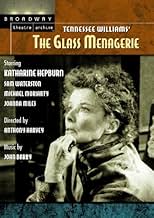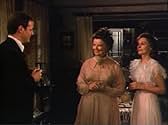Amanda Wingfield dominates her children with her faded gentility and exaggerated tales of her Southern belle past. Her son plans escape; her daughter withdraws into a dream world. When a "ge... Read allAmanda Wingfield dominates her children with her faded gentility and exaggerated tales of her Southern belle past. Her son plans escape; her daughter withdraws into a dream world. When a "gentleman caller" appears, things move to crisis point.Amanda Wingfield dominates her children with her faded gentility and exaggerated tales of her Southern belle past. Her son plans escape; her daughter withdraws into a dream world. When a "gentleman caller" appears, things move to crisis point.
- Director
- Writers
- Stars
- Won 4 Primetime Emmys
- 4 wins & 3 nominations total
- Director
- Writers
- All cast & crew
- Production, box office & more at IMDbPro
Featured reviews
Prior to watching this 1973 version with Katharine Hepburn, Sam Waterston, Michael Moriarty and Joanna Miles, there were two versions seen first. One was the 1987 version, which was my first filmed production of 'The Glass Menagerie'. The other was the Gertrude Lawrence and Jane Wyman film. Although the latter was a very respectable attempt despite the disappointing ending, the 1987 version is much better and of these three versions it's my favourite. This is a very worthy and really quite good production though where the detail and spirit is intact, with nothing toned down, nothing really tacked on and there isn't any re-ordering or re-working that affects any coherence (the case with the 80s TV film of 'Sweet Bird of Youth').
This production of 'The Glass Menagerie' is not perfect by all means. It is too dimly lit and makes the production a bit drab at times. Did feel that it could have opened up the drama more, the potential problem with television film adaptations of plays is being too much of a filmed play and being stagy, found that to be the case here.
In 'The Glass Menagerie', the dialogue is classic Williams. Just wished in this production that we had more time to hear it and take it all in and that the dialogue delivery wasn't as fast as it could be in places, especially with Katharine Hepburn.
However, lighting aside it is well and authentically designed and the photography isn't too intimate or distant. The audio adds to the atmosphere and doesn't jar with it. Despite the rushed line delivery at times, the dialogue may be talky but there is no denying its emotion. The staging also isn't perfect, but it's cohesive and just about avoids being over-heated and doesn't get dull. The ending like that of the play stays with you emotionally.
All four leads are hugely compelling with many moments of brilliance. Hepburn does indeed dominate but quite a lot of it is down to the character herself, she plays the heck out of the character and it's quite a towering portrayal overall regardless of some of the dialogue delivery and try-too-hard accent. Miles is very moving as Laura and pre-'Law and Order' Waterston is the embodiment of intensity. Moriarty is a different and interesting Jim and it was great to see a more likeable side.
Summing up, quite well done. 7/10
Furthermore, this presentation is far too static. Granted, stage plays are often difficult to translate to the screen, but this ABC TV-movie feels far too confined. Many of Williams' other plays have made the trip from boards to celluloid quite effectively, opening up with the freedom allowed by location filming.
Yes, this film is definitely worth seeing. However, I am now curious to see Gertrude Lawrence (1950), Shirley Booth (1966) and Joanna Woodward (1987) in the lead role.
Waterston is a bit of a scene chewer here, and I'm surprised at the Emmy wins for the other two leads, but in 1974, TV movie and series drama nominations were combined in the supporting categories. For Best Actress in a Drama, Hepburn was up against Tyson for "...Miss Jane Pittman," Elizabeth Montgomery for "A Case of Rape," and Leachman for "The Migrants." Tyson rightfully won.
To boot, if you're a fan of Katherine Hepburn, Sam Waterston, Michael Moriarty, or Joanna Miles - and what person in his right mind isn't a fan of all four? - then you need to be familiar with this production, which shows you not only the legendary Hepburn in an interestingly off-type role, but also three more of your favorite actors when they were budding.
Not that this production is perfect. Hepburn, as Amanda, dominates the action entirely too much for my taste, at times reducing the other characters to leaves swirling around the tempest she creates; Waterston sometimes alternates weirdly between a detached Hamlet-like cerebrality and raging tantrums worthy of a young Lear. In other words: the production does not well balance the two characters whose opponency is central to the drama. (It might be argued that Amanda is supposed to dominate the action, and that Tom is supposed to be wimpy, but I disagree. I think Tom's frustrated and repressed manhood needs to be portrayed in such a way as to convey a prodigious, if chained down, load of energy. Remember, this is a self-portrayal of the man who became Tennessee Williams!) True, if you concentrate you can catch some of the subtlety for which Waterston later became justly noted. But he is, so to speak, shouted down by Hepburn, who is entirely too much in focus. It is almost as if this production had been planned as a vehicle for her, and the character of Tom had been treated as a prop.
For my money, the real star of this show is Moriarty's masterful portrayal of the Gentleman Caller. Moriarty does not show us the power-tripping, manipulative bastard often associated with this role, but rather a nice guy who found himself in a compromising situation he never sought, and who tried naively to make the best of his ill-starred encounter with Laura, with the result that he bites off more than he can chew, and hurts Laura all the more by not intending it. The performance here really shines; I was very moved by his awkward feelings of guilt when he realizes his error.
Did you know
- TriviaTennessee Williams preferred this film version of his play over the 1950 one.
- Quotes
Amanda Wingfield: You are the only young man that I know of who ignores the fact that the future becomes the present, the present becomes the past, and the past turns into everlasting regret if you don't plan for it.
- ConnectionsFeatured in The 26th Annual Primetime Emmy Awards (1974)
Details
- Release date
- Country of origin
- Official site
- Language
- Also known as
- Tennessee Williams' The Glass Menagerie
- Filming locations
- Production company
- See more company credits at IMDbPro
Contribute to this page

























